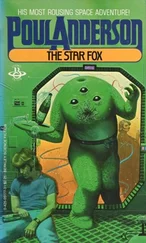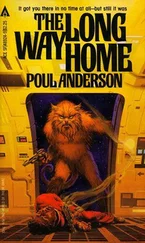They had had the coastal marshes to conceal them over anst of their route. The climb by night, however, straight up Onyx Heights, had required full moonlight if men were not to fall and shatter themselves. This meant virtually no moon on the second night, when they entered the cultivated part of the plateau. But with a sidereal period of two and a third days, Selene rose nearly full again, not long after the third sundown, and waxed as it crossed the sky. At present it was hardly past maximum, a dented disk flooding the land with iciness. Karlsarm felt naked to the eyes of his enemies.
None seemed aware of him, though. Fields undulated away to a flat eastern horizon, kilometer after kilometer. They were planted in rye, silvery and silent under the moon, sweet-smelling where feet had crushed it. Far off bulked a building, but it was dark; probably nothing slept within except machines. The fact that agriculture took place entirely on robotized latifundia made the countryside thinly populated. Hence the possibility existed for Karlsarm of leading his people unobserved across it after sunset—to a five-kilometer distance from Domkirk.
Even this near, the city looked small. It was the least of the Nine, housing only about fifty thousand, and it was the second oldest, buildings huddled close together and much construction underground in the manner of pioneer settlements. Aside from streets, its mass was largely unilluminated. They were sober folk here who went early to bed. In places windows gleamed yellow. A single modern skyscraper sheened metallic beneath—Selene, and it too had wakeful rooms. Several upper facets of the cathedral were visible above surrounding roofs. The moon was so brilliant that Karlsarm would have sworn he could see color in their reflection of it.
A faint murmur of machinery breathed across the fields. Alien it was, but Karlsarm almost welcomed the sound. The farmlands had oppressed him with their emptiness—their essential lifelessness, no matter how rich the crops and sleek the pastured animals—when he remembered his forests. He shivered in the chill. As if to seek comfort, he looked back westward. The fogbank that camouflaged the center of his army shimmered startingly white. Surely it had been seen; but the phenomenon occurred naturally, this near the Lawrencian Ocean. Beyond the horizon, barely visible, as if embodied, floated the three highest snowpeaks of the Windhook. Home was a long march off: an eternal march for those who would die.
“Stop that, you,” Karlsarm whispered to himself. He unshipped his crossbow, drew a quarrel from his quiver, loaded and cocked the piece. Hard pull on the crank, snick of the pawl were somehow steadying. He was not a man tonight but a weapon.
He trotted back to his people. The fog was thickening, swirling in cold wet drifts, as Mistress Randa sent ever more of her pets from their cages. He heard her croon a spell—
“Shining mist, flow and twist, fill this cup of amethyst.
Buzzing dozens, brotherlings, sing your lullaby of wings.
Ah! the moonlight flew and missed!”
He wondered if it was really needed. Why must women with Skills be that secretive about their work? He heard likewise the tiny hum of the insects, and glimpsed a few when Selene sparked iridescence off them. They kept dropping down to the ryestalks after they had exuded all the droplets they could, filling up with dew and rising again. Soon the cloud was so dense that men were almost blind. They kept track of each other by signals—imitated bird calls, chirrs, cheeps, mews—and by odor, most of them having put on their distinctive war perfumes.
Karlsarm found Wolf near the red gleam of one hell-hound’s eyes. “All set?” he asked.
—Aye. If we can keep formation in this soup.”
“We’ll keep it close enough. Got a lot of practice in the tidelands, didn’t we? Very well, here we go.” Karlsarm uttered a low, shuddering whistle.
The sound ran from man to man, squad to squad, and those who knew flutecat language heard it as: “We have stalked the prey down, let us leap.”
The fog rolled swiftly toward Domkirk; and none in the city observed that there was no wind to drive it.
* * *
John Ridenour had arrived that, day. But he had made planetfall a week earlier and before then had crammed himself with every piece of information about Freehold that was available to him—by any means necessary, from simple reading and conversation to the most arduous machine-forced mnemonics. His whole previous career taught him how little knowledge that was. It had amused as well as annoyed him that he ended his journey explaining things to a crewman of the ship that brought him thither.
The Ottokar was a merchantman, Germanian owned, as tautly run as most vessels from that world. Being short of bottom on the frontiers, the Imperial Terrestrial Navy must needs charter private craft when trouble broke loose. They carried only materiel; troops still went in regular transports, properly armed and escorted.
But Ridenour was a civilian: also on time charter, he thought wryly. His job was not considered urgent. They gave him a Crown ticket on Terra and said he could arrange his own passage. It turned out to involve several transfers from one ship to another, two of them with nonhuman crews. Traffic was sparse, here where the Empire faded away into a wilderness of suns unclaimed and largely unexplored. The Germanians were of his own species, of course. But since they were a bit standoffish by culture, and he by nature, he had rattled about rather alone on what was to be the final leg of his trip.
Now, when he would actually have preferred silence and solitude, the off-duty steward’s mate joined him in the saloon and insisted on talking. That was the , annoyance—with Freehold in the viewscope.
“I have never seen anything more… prachtig more magnificent,” the steward’s mate declared.
Then why not shut your mouth and watch it? grumbled Ridenour to himself.
“But this is my first long voyage,” the other went on shyly.
He was little more than a boy, little older than Ridenour’s first son. No doubt the rest of the men kept him severely in his place. Certainly he had hitherto been mute as far as the passenger was concerned. Ridenour found he could not be ungracious to him. “Are you enjoying it… ah, I don’t know your name?”
“Dietrich, sir. Dietrich Steinhauer. Yes, the time has been interesting. But I wish they would tell me more about the port planets we make on our circuit. They do not like me to question them,”
“Well, don’t take that to heart,” Ridenour advised. He leaned back in his chair and got out his pipe—a tall, wiry, blond, hatchet-faced man, his gray tunic-andtrousers outfit more serviceable than fashionable. “With so much loneliness between the stars, so much awe, men have to erect defenses. Terrans are apt to get boisterous on a long voyage. But from what I’ye heard of Germanians, I could damn near predict they’d withdraw into routine and themselves. Once your shipmates grow used to you, decide you’re a good reliable fellow, they’ll thaw.”
“Really? Are you an ethnologist, sir?”
“No, xenologist.”
“But there are no nonhuman on Freehold, except the Arulians. Are there?”
“N-no. Presumably not. Biologically speaking, at any rate. But it is a strange planet, and such have been known to do strange things to their colonists.”
Dietrich gulped and was quiet for a few blessed minutes.
The globe swelled, ever greater in its changing phases as the Ottokar swung down from parking orbit. Against starry blackness it shone blue, banded with blinding white cloudbanks, the continents hardly visible through the deep air. The violet border that may be seen from space on the rim of any terrestroid world was broader and more richly hued than Terra’s. Across the whole orb flickered aurora, invisible on dayside but a pale sheet of fire on nightside. It would not show from the ground, being too diffuse; Freehold lacked the magnetic field to concentrate solar particles at the poles. Yet here it played lambent before the eye, through the thin upper layers of atmosphere. For the sun of Freehold was twice as luminous as Sol, a late type F. At a distance of 1.25 a.u., its disk was slightly smaller than that which Terra sees, But the illumihation was almost a third again as great, more white than yellow; and through a glare filter one could watch flares and prominences leap millions of kilometers into space and shower fierily back.
Читать дальше











